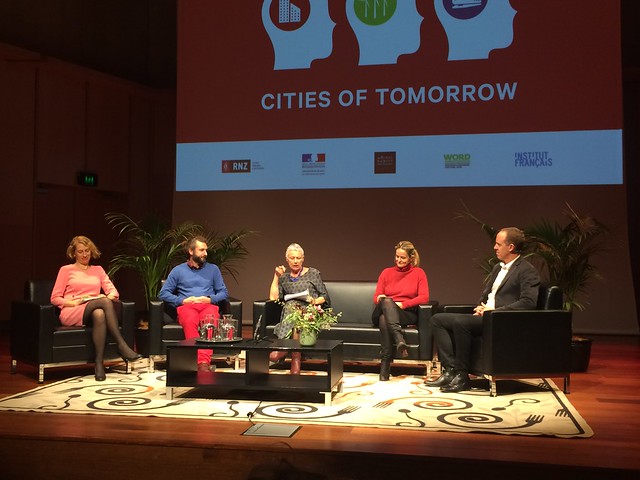When it comes to city-building and urban planning, people in Christchurch have more to say about this than they ever have. We're at a crucial point in our recovery where most of the old that will go has and we're getting a clearer and clearer idea of what the new will actually be like. It's an in-between place, a liminal place, and not necessarily a comfortable place.
So picking the brains of experts in the field of governance, sustainability and city planning seems like a good idea. Sure, we might all have opinions about how to make a city that offers a better life for its inhabitants but they're not necessarily well informed ones. What do the experts think?
On the panel for this session were French experts Marie-Anne Gobert of Lyon, Cécile Maisonneuve of Paris, Mark Todd of Auckland property development company (and literary prize sponsors) Ockham, and former Christchurch resident (who now lives in Sydney) Barnaby Bennett.

Radio New Zealand presenter Kim Hill had what turned out to be a reasonably challenging job, in keeping the discussion moving along, correctly interpreting the French accents, and managing the audience input - tasks she undertook with her characteristic gentle belligerence.
Speaking of the audience, this was byr far the most vocal crowd I've been part of in the festival so far. Christchurch people are, generally speaking, fairly undemonstrative in these kinds of events but this topic generated much spontaneous clapping (mainly when Central Government was pinned as having failed in some respect) and vocal affirmations of the "hear, hear" variety.
I guess when an author is discussing their work we're happy to sit and listen, but we are all, to some extent or other, experts in our own city and people attending this session obviously have a reasonable level of engagement with the subject matter.
The main points that stuck out for me were -
- Local authorities need to be willing to take risks and to experiment, to try small-scale pilots of things to learn if they work and then be scaled up if successful. Failure, particuarly when small, fast and comparatively inexpensive aren't cause for shame or embarrassment, they're a crucial way to learn what works and what doesn't.
- Good public transportation is vital.
- Engagement with communities needs to be iterative.
- Stratification of the rich and poor is really bad for cities and the people who live in them
- Public-private partnerships can work if the terms are clearly defined
The question and answer session at the end was unfortunately rather overshadowed by a gentleman (I use the term loosely) from Southland who ranted on and on and even with prodding from Kim Hill simply refused to get to the point, prompting her to ask -
I appreciate this dystopian polemic, sir...but is there a question?
The crowd was actively booing him and telling him to shut up at this point and by the time he insulted Barnaby Bennett's dress sense, he'd lost pretty much everyone. It was the most extraordinary thing I've ever seen at a literary festival.


Add a comment to: Cities of tomorrow: A better life? – WORD Christchurch